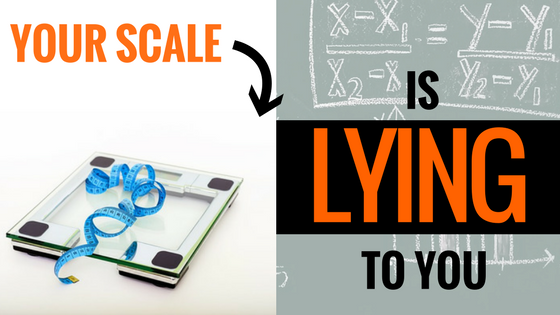
Revive Stronger
Trust the process, don’t always trust the scale

Throw away your scale.
It’s lying to you.
Now come on, you know I don’t really mean that right? Previously I’ve written an entire article on why I think measuring your bodyweight is such a good idea, an essential tool in your body composition tool box.
So what do I mean?
Well you know what, I do think sometimes the scale isn’t your friend, and it can be sneaky and hide things from you. Not necessarily lying, but for sure hiding the truth, and this was also touched on in the previous article, in that the scale fluctuates for multiple reasons, daily, weekly and monthly.
However, it is one thing to say it, and another to give you an in-depth personal example of how the scale can ‘lie’ and how to avoid falling for its mistruths, and stay on track. So that is what we’re going to do today.
Table of Contents
When Gaining Weight
Let’s first address times at which the scale lies to us when gaining weight.
OK so we’ve established our Calories, we know we should be eating in a surplus given we’ve got historic data of how many Calories it took to keep our weight stable. Just for this example say we’re in a 500kcal surplus, bringing us to a 3500kcal net surplus by the end of the week, which should theoretically lead to a 1lb gain that week.
However, we must recognise a few things here:
- When we eat more the Thermic Effect of Food (TEF) goes up
- When we eat more we may increase our Non Exercise Activity Thermogenesis (NEAT) substantially
These two factors in themselves can throw off our scale expectations quite substantially, however unless you get incredibly hyperactive from eating more food you’re unlikely to rid yourself of being in a surplus. This is one reason I favour larger surpluses, as often people (especially those who struggle to gain weight) end up just jacking up their unconscious activity and rid the surplus all together.
Now what we have established is that we’re in a surplus and so overtime we will gain weight. However, very rarely does our weight move predictably during our surplus, this is when the scale seems to lie to us.
1.] Your weight dips unexpectedly
We’ve all been there, in a gaining phase, stuffing our faces with food and one day our weight drops, and possibly our entire weekly average drops. What the hell? Don’t you have to be in a Calorie deficit to lose weight? You might get upset, you might drown yourself in ice cream with the aim to bring your weight back up.
HOLD ON
This is one case where the scale is fibbing. What do we know? We know you’re eating plenty (you’re full like all the time right?) and we know you’re eating more than you would normally maintain on, substantially more. Take a second and really think about times when you have been cutting and losing weight, now imagine cutting on the Calories you’re eating now…not very likely right?
Your weight is down, but you’ve not actually lost any lean or muscular tissue, it’s a blip, the scale isn’t showing you bodyweight changes you’re worried about. For whatever reason you’ve had a week of lower weigh ins, this is likely down to one or a combination of: eating more Calorie dense foods, consuming less sodium, drinking less water, eating your last meal earlier before bed, drinking alcohol (dehydrated), consuming fewer carbs.
It’s a shift in water weight.
Hold tight, don’t raise Calories needlessly, more than likely in another week you’ll see your weight stabilise to a new high. Now if you are low on energy and finding yourself hungry, maybe you’re not eating enough. But always take a moment to really assess the situation, because rushing to eat more might not be the right thing to do.
This happens to me a lot after periods of cutting, I’ve gone from 2000 Calories all the way up to 3000 Calories and lost a couple of pounds over the next few weeks. Now we all know I’m not in a deficit, but the scale is coming down and this could be due to; drops in cortisol leading to drops in water or even just a delayed fat loss effect (which will be explained more below). What I do know however is that I don’t need to add more Calories to the situation and just give my body a chance to catch up.
2.] Your weight jumps unexpectedly
Another situation you’ve no doubt been in, again eating your fill and your weight has been raising nicely week on week, and then suddenly out of nowhere BOOM you’re up 2lbs or maybe more. You check back at your myfitnesspal, did I account for everything? Maybe I under estimated some meals out? Quite possibly you’re tempted to go on a short cut the next week to bring your weight back into line.
HOLD ON
The scale may well be fibbing to you again. Now take a step back, look back at what you know? You know you’re in a surplus, but not an excessive one compared to your maintenance Calories. Have you really eaten way more than usual this week, or been super lazy? No…as far as you’re concerned nothing has changed.
Your weight is up, but again, the majority of this change is unlikely to be anything but a blip. Just like with the sudden drop in weight quite possibly a few things have happened: you ate later than usual, you ate more sodium, you weighed in earlier, you were more stressed this week, you were more sore from training this week etc. etc.
It’s more than likely a shift in water weight.
3.] Your weight doesn’t change
Something I have also noticed anecdotally is that when the weight suddenly increases it doesn’t come back down, but it levels out i.e. over the next few weeks your weight doesn’t move much. This for me is kinda like a growth spurt, you know when you’re a kid you suddenly grow a few inches taller but then it slows down, I’ve seen the same with many clients and myself when gaining weight.
Or if your weight is stable after many weeks of gaining you might be due a growth spurt (a sudden jump in weight). Sure you might need to top your Calories up, and I’d need to know the entire context to decide whether that was true. But, if you’ve been gaining well (1lb every few weeks), and nothing much has changed but suddenly you stall for a week or two, more than likely you’re in a surplus, you’re just due a jump.
When Losing Weight
Right so we’ve decided to go on a diet, as before we have previous data on how many Calories it takes us to maintain weight and we slash 500 Calories a day, again we’re shooting for that 1lb weight change, but this time downwards. However, we must come back to the two points above, but look at them differently:
- When we eat less the Thermic Effect of Food (TEF) goes down
- When we eat less we may decrease our Non Exercise Activity Thermogenesis (NEAT) substantially
Again we can’t forget about these two factors, because they certainly mess with our numbers. Different people will see a different impact from this, especially point 2 – some people go into sloth mode when you remove Calories, others seemingly don’t even notice they’ve gone down. However, unless you’re doing something very odd, it’s unlikely you’ve removed the entire deficit, and so over the long-term will lose weight.
1.] Your weight dips unexpectedly
Oh this is a pretty glorious moment right, most people probably don’t worry much when their weight dips. However, some of you might, especially if you’re concerned about muscle loss. If you lose 2% of your total bodyweight in a week you might be concerned, especially so if you’re lean.
An unexpected dip can happen for a variety of reasons:
- You’ve had a very low stress period
- You’re in the early stage of the diet and dropping lots of stored water/glycogen
- You’re dehydrated
- You’ve been maintaining weight (unexpectedly)
It’s more than likely down to one of the above reasons, and if it is then you do not need to worry. For the most part I discount the first couple of weeks when entering a new phase of dieting due to lots of water and glycogen changes. In addition this is very common, and is usually followed up by or came after a period of unexpected maintenance.
2.] Your weight jumps unexpectedly
This is the worst moment in a dieter’s life, you weigh in first thing and ohhhh nooo you’re up a couple of pounds. This trend continues through the week so that on average you’ve not lost weight. But you’ve been consistent with your diet, you did your cardio, you got your steps in and so should have been losing weight as per usual.
What the hell is going on?
Just as above there are lots of things that could be happening; you had a stressful week, you ate more sodium, weighed in earlier, were very sore from the gym etc. etc. The key thing to remember is you’ve got no reason to believe you’re not in a deficit, and you have every reason to believe you’re losing fat.
Hopefully you’ve been taking waist measurements and pictures and they’re indicating fat loss.
This is super common, and one of the worst things you can probably do is jump the gun and cut Calories further, because more than likely that’ll lead to more stress, and could lead to even further weight gain. You must remember the facts, keep a long-term view on things and stick to your guns.
3.] Your weight doesn’t change
Now this is what I am experiencing right now, I’ve had experience with all the above and have seen the above in my own clients. However, right now I am seeing a stall in my weight change, it’s simply not moving. Now I can give you real-time context and examples of what’s happening right now:
- Training: from lower volume strength training to higher volume hypertrophy training
- Nutrition: Calories down from 3200 to 2400
- Cardio: no change, but steps have increased on average from 8k to 10k+
Now I was maintaining weight on 3200kcal, and my activity levels were lower, so by cutting 800 Calories from my diet too you would expect a pretty big drop in my scale weight right? I sure did, but it hasn’t happened. My weight has pretty much stayed level around 175lbs for coming on 3 weeks, and if I am honest, it sucks, I like seeing nice losses in weight, especially early on in a diet.
However, I’ve not changed anything, because…I know the scale isn’t telling the whole story.
Now I’ve gone from low volume training to high, this may have led to some lean muscle tissue growth, that of course will have led to less weight loss, but still it’s not like I’d gain very much muscle at all in this time. The biggest thing that has happened is just the fact I’ve entered a deficit, and increased my activity levels, both of which are big stressors on the body.
I’m holding onto water.
Ever had a time when you’ve not seen your weight drop for a number of weeks, don’t change anything and then suddenly ‘whoooosh‘ it drops off? This is a real thing, and Lyle McDonald has written and spoken quite extensively about it. So we know fat loss isn’t linear, in fact nor is weight gain, sure in the long run they are, but in the shorter/medium term, they’re not.
So in this case I’m cutting, working my ass off, weighing my food and seemingly have nothing to show for it on the scale. In comes Lyle McDonald:
“after fat cells had been emptied of stored triglyceride, they temporarily refill with water (glycerol attracts water, which might be part of the mechanism). So there would be no immediate change in size, body weight or appearance. Then, after some time frame, the water would get dropped, the fat cells would shrink. A weird way of looking at it might be that the fat loss suddenly becomes ‘apparent’. That is, the fat was emptied and burned off days or weeks ago but until the water is dropped, nothing appears to have happened.”
And that’s why above I said that you might see a sudden dip after a period of experiencing little to no weight loss, because the body has lost the fat but is holding water. So personally I am holding tight, everything else indicates fat loss, the only thing that isn’t is the scale. If I was to slash Calories or add more exercise I could quite easily make the situation worse, adding more cortisol to the mix, leading to more water being retained.
Trust the process, not the scale
Hopefully you identified a theme from the above examples, in that the scale never lies, it only reports data. It cannot lie, if you weigh more, or less on a given day it’s a fact. However, what it cannot tell you is if you’ve lost or gained fat/muscle (even if it is a fancy one that tries to estimate your body fat % – James Krieger can tell you why these are not accurate). For sure it can indicate those things, but it’s important to keep in mind it’s only an indication.
The other theme I hope you identified was that in all cases if you removed the scale from the situation, all worries were removed. In that in every case the changes were unexpected because we had good reasons to believe everything was going in the right direction and that what you were doing was working. It takes a lot of balls to trust the process, but you really need to – just don’t do it blindly. You’re tracking your body weight, your food intake, your gym performance, using pictures, historic data, circumference measurements, you therefore need to use all of these in combination before making rash decisions.
[bctt tweet=”Trust the process, don’t always trust the scale.” username=”revivestronger”]
What Next?
Join our free facebook group or add us on snapchat (revivestronger) and ask your question there, I will respond asap. Or if you’re after a fresh training programme we have a free 4 week plan using DUP that you can download for free here. One more thing… Do you have a friend who would love the above? Share this article with them and let me know what they think.
[bctt tweet=”When the scale lies” username=”revivestronger”]
We are a personal coaching service that helps you achieve your goals. We want you to become the best version of yourself.










Comments are closed.